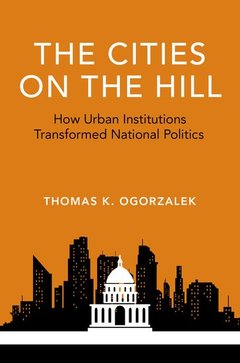Description
The Cities on the Hill
How Urban Insitutions Transform National Politics
Studies in Postwar American Political Development Series
Author: Ogorzalek Thomas K.
Language: English
Subject for The Cities on the Hill:
The Cities on the Hill
Publication date: 06-2018
352 p. · 23.9x16.3 cm · Hardback
Publication date: 06-2018
352 p. · 23.9x16.3 cm · Hardback
The Cities on the Hill
Publication date: 08-2018
352 p. · 15.8x23.5 cm · Paperback
Publication date: 08-2018
352 p. · 15.8x23.5 cm · Paperback
Description
/li>Biography
/li>
Over the second half of the 20th century, American politics was reorganized around race as the tenuous New Deal coalition frayed and eventually collapsed. What drove this change? In The Cities on the Hill, Thomas Ogorzalek argues that the answer lies not in the sectional divide between North and South, but in the differences between how different kinds of places govern themselves. Using a wide range of evidence from Congress and an original dataset measuring the urbanicity of districts over time, he shows how the trajectory of partisan politics in America today was set in the very beginning of the New Deal. Both rural and urban America were riven with local racial conflict, but beginning in the 1930s, city leaders became increasingly unified in national politics and supportive of civil rights- and sowed the seeds of modern liberalism. As Ogorzalek powerfully demonstrates, the red and blue shades of contemporary political geography derive more from rural and urban perspectives than clean state or regional lines. Moreover, his analysis explains how city institutions can help build bridges over the divides that keep us apart.
Thomas K. Ogorzalek is Assistant Professor of Political Science and Urban Studies at Northwestern University, where he is also a Civic Engagement Fellow and Co-Director of the Chicago Democracy Project. A lover of cities, for the ways they change and the ways they don't, he lives in Chicago.
© 2024 LAVOISIER S.A.S.




